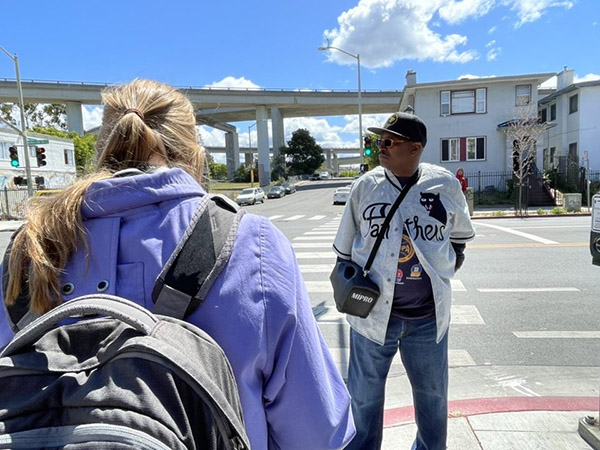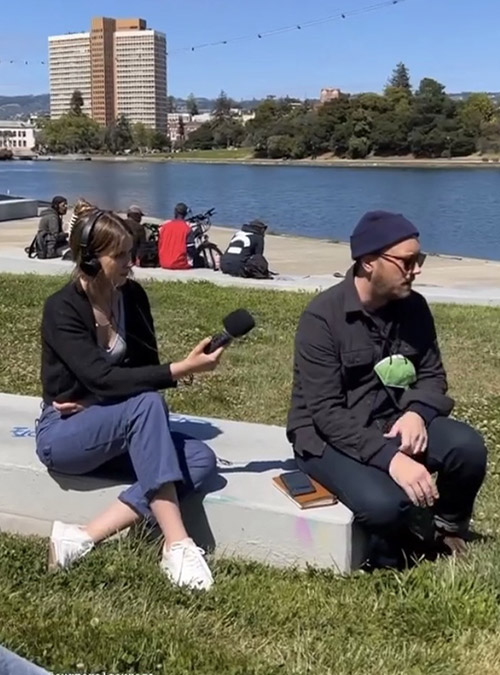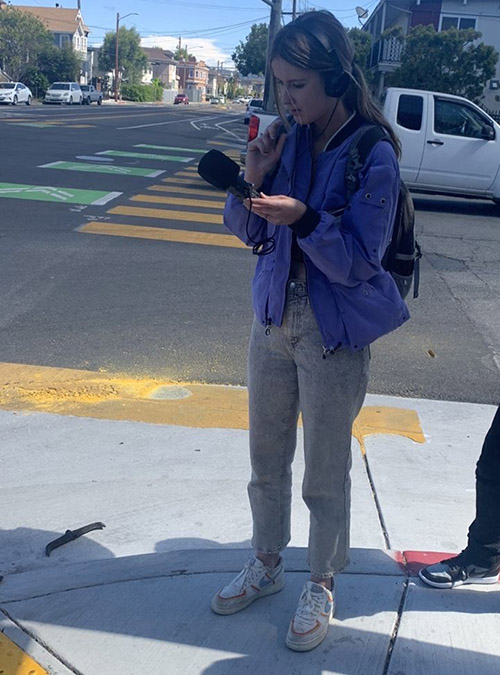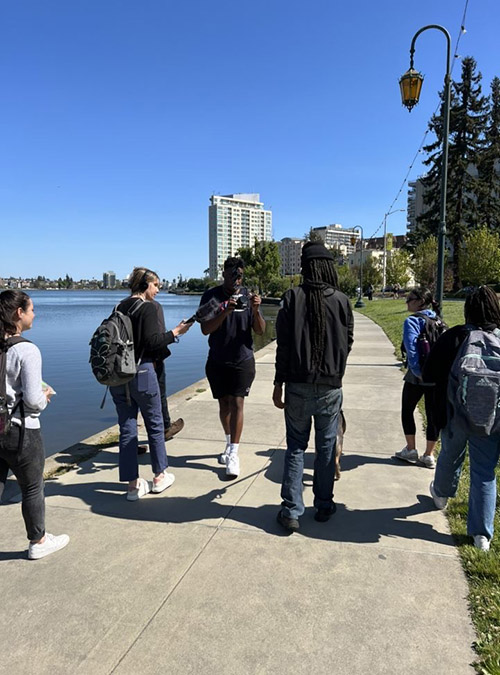Building community, story by story
Access to affordable housing is not something most UD students think about as they go to class, sit on their porch in the neighborhood or take a walk down on Brown Street.
But Anna Luepke does. She thinks about it every day.
Luepke, a senior political science and economics major, has committed her almost four years at UD to solving the affordable housing crisis and improving the lives of others.

Growing up in her hometown of St. Louis, she attended an all-girls school run by the Loretto nuns, who are known for being passionate about protesting for what is right. This background sparked Luepke’s willingness to advocate for equality and went hand-in-hand with an interest in advocating for affordable housing that also bloomed in high school.
She said her eyes were opened when she did a history project on the Delmar Divide, an infamous racial and economic segregation line along Delmar Boulevard in St. Louis. She lived right next to it growing up, and she witnessed its repercussions firsthand.
“That project changed my worldview because I have always been interested in these issues, but I do not think I had a full understanding,” she said.
Luepke’s sister, Grace Luepke, attended UD and graduated in 2019 with a degree in communication. Though she originally did not plan to follow in Grace’s path, Luepke loved how kind everyone was on campus, and once she learned of the UD’s Moral Courage Project, her fate was sealed.
The Moral Courage Project is a biennial initiative of UD’s Human Rights Center that uses media to tell the stories of people of great moral courage who solve issues in their own communities. As a part of the fourth project cohort, Luepke and other students have been focused on the housing crisis in Oakland, California, having taken a trip there in May. Students will produce a podcast (preview it here), a magazine, an artistic exhibit and a documentary on the topic with information and interviews they gathered.
Luepke explained how the people she interviewed, who are currently fighting the housing crisis in Oakland, exemplify moral courage because even though the world sees them as ordinary people, they are the ones who are working to solve the issues that plague their neighborhoods. Some of whom she interviewed have experienced homelessness, and they showed her the significance of having a secure place to oneself.
“They taught me that ‘home’ is so much more than just having a roof over your head,” she said.
“They taught me that ‘home’ is so much more than just having a roof over your head.”
In addition to her work with Moral Courage, Luepke recently completed a stint as an ethics intern at St. Mary’s Development Corp., which houses low-income seniors in Dayton. She interviewed residents about their lives and challenges, and the profiles she wrote about each resident have been collected into a book and podcast. The book is titled Hope! Stories of Resilience, Perseverance and Faith Told by the Residents of St. Mary Development’s Apartment Communities for Older People. It is available for purchase by contacting St. Mary's Development Corp.
The questions Luepke asked helped the residents, who were originally wary when their interviews began, open up. She asked questions like “What was your neighborhood like?” and “Knowing what you know today, if you could give advice to younger you, what would it be?” This gave the residents the opportunity to generate fond memories of the communities they lived in growing up and to contemplate what they have learned throughout their lives.
“Nobody had ever really asked these questions of them — at least in a very long time — so they loved to share the story of their lives and reflect on it themselves,” she said.
*This audio clip features the singing of Arnesta Russell, who has found solace in gospel music for her entire life. Her home and neighborhood were filled with music, and Mahalia Jackson, a famous gospel singer and friend of Martin Luther King Jr., often came to Russell’s home to practice.
While the residents enjoyed having a voice to tell their stories, these stories were often heart wrenching, Luepke said.
One such story was that of Adrian Redd, who woke up paralyzed one morning when he was just 3 years old. His parents could not afford the equipment to help him move and Social Security refused to help, so all he could do was crawl on his hands and knees.
Adrian told Luepke he always had his mother to care for him, and she always reassured him that God had a plan. Adrian said his faith saved his life because after bravely riding a bike for the first time and crashing, he stood up for the first time in years and never had to crawl again.
Luepke has also had experience in Dayton neighborhoods through her work as a Dayton Civic Scholar and through UD’s Leadership in Building Communities seminar. For Dayton Civic Scholars, students are interviewing residents in West Dayton about what improvements they would like to see in their communities, and the scholars are working with the city to help residents make these improvements without gentrifying the neighborhoods.
Luepke is receiving a scholarship through Dayton Civic Scholars and said she is grateful for how much she has learned through the program.
“Before my time at DCS, I often thought of political change as something that occurred nationally,” she said. “However, working with local communities in Dayton has made me realize that the greatest change occurs at the hands of local neighborhood leaders.”
Similarly, her Leadership in Building Communities seminar picked the College Hill neighborhood in Dayton to analyze and asked residents questions about what goals they would want to accomplish for their neighborhoods. Luepke said she truly valued these firsthand opportunities because she learned about how West Dayton residents’ resources and struggles inform the goals they have for their neighborhoods.
“Oftentimes I feel like we are in this bubble — the UD bubble,” she said. “That has been a really interesting class because we actually get to meet residents of Dayton.”
“That has been a really interesting class because we actually get to meet residents of Dayton.”
Luepke plans to go to law school and continue working in the affordable housing field. She said her experiences at UD have been integral in developing this drive, and she has realized how the smallest things can be fundamental to fostering communities.
One example is that of the playground in the College Hill neighborhood, which Luepke helped refurbish as part of the seminar. A simple playground may not seem tremendously important, but Luepke emphasized that having a healthy playground unites neighbors and inspires them to work together to solve community issues.
“Some people might think that renovating one playground in one neighborhood in Dayton, Ohio, is not going to change much, but it is going to change a lot for the people in this neighborhood,” she said. “A playground can be so much more than just a playground.”


